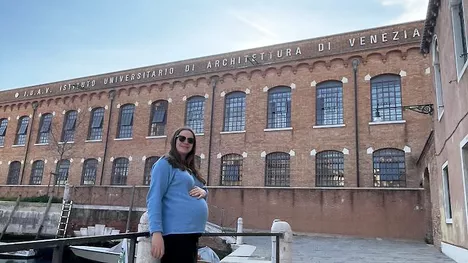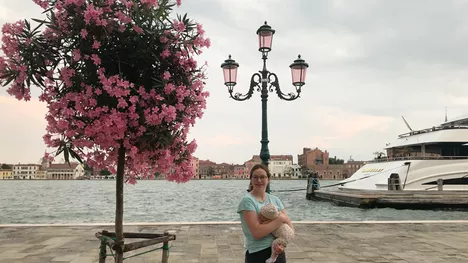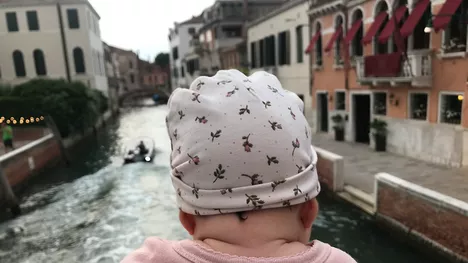
Things are actually quite simple if you want to go abroad with Erasmus+: you find out about the program, apply a good year before your planned stay, and, ideally, are accepted at the university of your choice. But what happens if you find out shortly beforehand that you are pregnant? Cancel everything and stay at home – or find ways and means to fulfill your dream of studying abroad despite the difficult circumstances? TUM student Rafaela Averbeck chose the second option and told us how she experienced her two semesters at the IUAV in Venice, first as a pregnant woman and then with her baby.
Hello Rafaela, and first of all, thank you for taking the time to talk to us!
You had applied for your Erasmus stay before you became pregnant. A very courageous decision to go to Venice anyway. What motivated you to go through with your plans?
For me, there was no question of not going abroad. Somehow you get everything organized.

How many months pregnant were you when you went to Italy?
Two months.
Did you contact anyone from your School?
I first contacted the academic advisor and the Erasmus+ team in the fourth month to clarify whether it was possible to take fewer ECTS credits in the second semester and how the top-up worked.
So you already knew about the Erasmus top-up for students with children?
Yes, there was an option to tick top-ups in a document during the application process. However, that was quite early on, when it wasn't relevant for me. But I remembered it later.
What was it like on campus in Venice? How did your fellow students react?
Everyone was very surprised. My Italian group partners thought I should have given them a little warning because I just plain told them I was pregnant. My flatmates were also perplexed, but everyone was happy for me.
One disadvantage regarding socializing with other students was that I couldn't drink alcohol. I didn't really mind that much, but I would have liked to try the typical Venetian Aperol Spritz or Select after university. Which, by the way, were cheaper than non-alcoholic cocktails. I also found it a bit difficult to be careful not to eat raw meat, fish, milk, or eggs. In a foreign country, it's a bit different, also with the labeling, but that quickly became easier, too.
Especially towards the end of my pregnancy, I found it an advantage that I usually got a seat on the overcrowded water buses – the Vaporettos – and was often approached nicely, especially after I had had my baby. This made it much easier to strike up a conversation.

How did the host university react to your situation being pregnant and later as a mother? Did you receive any support on-site?
I wrote to the Erasmus officer at my host university to ask if there was anything I needed to do and if it was OK with the courses. She replied: "Stare tranquilla. Fare un bel bambino", which means: "Stay relaxed, make a beautiful child". I didn't receive any further support or offers in that sense, but I didn't really need any.
The doctor's appointments were mainly in Germany. And I also went to Germany for the birth - being close to my family was very important to me.
Have you met other mothers or fathers on campus?
When I had my daughter with me at university once, it turned out that we also had a new dad among our fellow students. His daughter was two months older than Miriam. We talked a bit and that was really nice because it made us both feel less alone in our situation.
What was the daily routine like during your semester abroad with a baby?
For the time I would be in Venice with my baby, I had rented an apartment very early on, which was a five-minute walk from the university. My mother and my boyfriend were there for a while and looked after the baby. I always went home during lunchtime and took short breastfeeding breaks between classes. The other students were delighted with my baby and wanted me to take my daughter with me more often. That went quite well in the workshop. The professors were also very understanding and were happy to see a baby on the course.
In what ways were you able to use the Erasmus top-up?
The Erasmus top-up helped me a lot in that I could rent an apartment near the university – which was more expensive but made my life a lot easier. In my other apartment, on the fourth floor, half an hour's walk from the university, the whole process probably wouldn't have worked.

Were you able to manage your studies despite your pregnancy and child and complete all the required credits (20 ECTS per semester)?
In the first semester in Venice, when I was "only" pregnant, I did more credits, namely 36, which was quite exhausting. In the second semester, I only did 18 credits. I wasn't always able to attend some lectures in the second semester, but thanks to my notes I was still able to pass the exams quite well.
Was your course of study affected or did you have to extend your study time?
I didn't have to extend my studies at TUM because I had already studied at TUM for a year before my degree and was able to have some credits recognized. So unofficially I will have studied for ten semesters instead of eight.
What intercultural experiences have shaped you in your situation as a pregnant woman and mother and what resolutions have you taken with you to Germany?
Italy is a very child-friendly country. People were really welcoming and kind. My fellow students and friends often stroked my round belly. Hardly anyone would do that in Germany, but it happens and feels normal in Italy.
My resolution for Germany is to rush myself less often because it's usually not worth it. This doesn't necessarily have anything directly to my pregnancy, but I think it's an excellent general insight!
Thank you very much for the exciting insights, Rafaela. And all the best for you and Miriam!